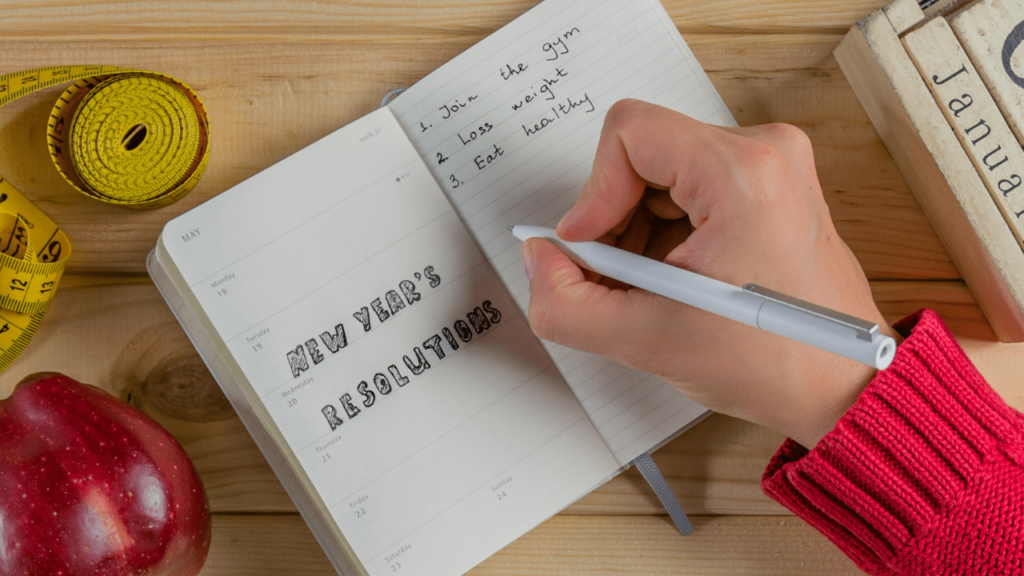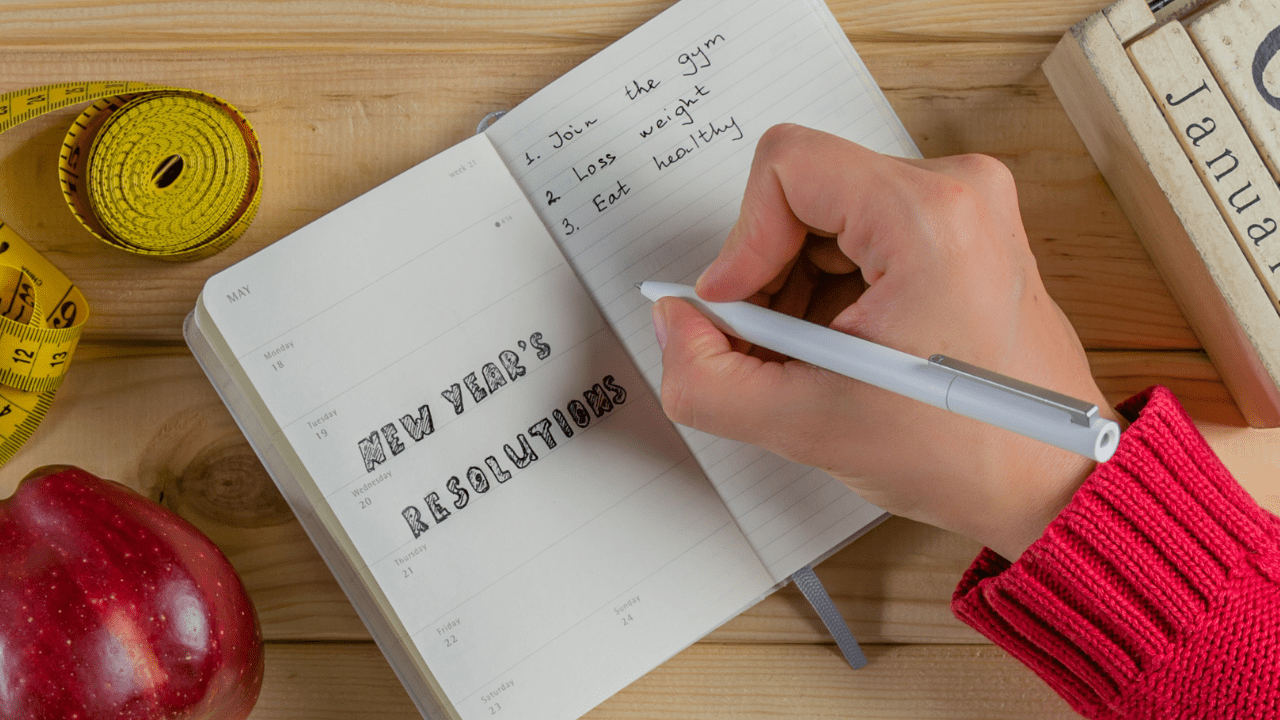As we ring in the new year, many people resolve to improve their health – which is awesome! But can also leave a lot of people feeling defeated when their health resolutions fade in several weeks to several months. The key is starting with the right kind of resolutions. Try these tips for health resolutions that will stick this year.
1. Don’t Demand Perfection with Your Health Resolutions
We’re not perfect – resolutions shouldn’t be either.
The quickest way to derail yourself is to demand perfection. So you can exhale and release that weight from yourself right off the bat.

For some reason, we humans think that when the clock strikes midnight we’ll suddenly have the willpower to change everything about our lifestyle overnight and stick to it perfectly.
You’ve built your habits over years, maybe even decades – it’s going to take time to shift those habits and behaviors. It’s important to recognize that and give yourself grace as you build new thinking patterns, routines, and retrain your brain.
2. Don’t Cripple Your Health Resolutions with All-or-Nothing Thinking
No single choice will make you healthy or unhealthy. You can’t choose a healthy meal one night at dinner and expect that your body is suddenly a model pillar of health. Similarly, having one less-than-ideal meal is not going to single-handedly make you unhealthy.
Both health and disease happen over the course of years and hundreds of thousands of microchoices. Heath is a spectrum and every day we have hundreds of options that will move us closer to one end of the spectrum or the other. That’s it.
I watched all-or-nothing thinking derail people all the time. “I messed up,” they say on a Thursday, “I’ll just start over Monday.” Yikes – there are so many opportunities between Thursday and Monday to make healthy choices for your body! There doesn’t need to be a declared “do over” – simply make a better choice with your very next decision. Drank a soda at lunch? Great, just drink a glass of water next and continue on with your day.
Don’t let all-or-nothing thinking derail your progress. Remember – you get hundreds of microchoices every day. Focus on making the next right choice.
3. Ditch the Defeating or Shaming Vocab
If you’ve been around the fitness world for any length of time, you may have heard things like “cheat day” or “cheat meal” – a single meal or a full day when people justify that they get to eat whatever they want because it’s their designated day to do so.
Have you ever heard an instance when “cheat” meant anything good? I certainly haven’t.

When you subscribe to a language construct that implies shame or wrongdoing, even subconsciously, it can set you up for a couple tricky mindsets – 1) assigning shame to your food or physical habits and 2) slowly training your mind to associate an enjoyable meal as “cheating”.
It seems like a far cry, but the road to disordered eating is shorter than most people think. Especially for athletes and those with a competitive nature.
Health is a spectrum and our lifestyle choices simply move us closer or further from health. No need to assign or attach anything beyond that.
4. Start with One Area to Improve
Another classic pitfall is deciding to change 7 areas of your life all at once.
“I’m going to go to bed by 10:00pm, wake up by 6:00am, work out every single day, train for a marathon, drink 64 oz. of water, cut out junk food, give up caffeine, AND eat salads for lunch every day.”
Health resolutions should be based on reality!
I’m exhausted even listing that hypothetical situation, but so many people do this to themselves!
If you’re prone to moments of hyper motivation and very lofty goals, try this instead – pick one area to make a change and start there. Maybe you’re notoriously bad at drinking water (*raises hand*) – start with simply committing to starting your day with a glass of water.
Which brings me to another point…
5. Start with Small Health Resolutions
Using the example from above – if you currently drink 4 oz. of water a day, it’s possible but not reasonable to expect that you’re going to up your water intake by 60 oz. every single day.
What’s the harm in just focusing on a glass of water first thing in the morning when you wake up? Do that for 2 weeks, let your body recognize and register that drinking water first thing makes you feel good.
Next, add a glass of water at lunch. Do that for 2 weeks. Add a glass at dinner. Do that for 2 weeks.
You may look at this example and think, “that’s still only 24 oz. a day and you’re 6 weeks in.” True. But what’s better – 4 oz. or 24 oz. a day?

Not only have you increased your water intake sixfold, you’ve also done it in a much more sustainable way. You’ve let your body acclimate and register the positive effects of this new habit to a point where your body will now crave at least 24 oz. of water each day. From there, you just incrementally increase until 64 oz. is so habitual that you don’t even have to think about it.
Small, slow changes that endure beats fast, massive changes that fade as quickly as they came.
6. Focus on Adding Before Removing
Lastly, we hate when things are taken away from us. We just do. So the best plan of action when trying to make change is usually not heading straight for removing foods and drinks from your diet.
It depends on where you are in your health journey, but for those who are just starting out – you may find it easier to add until you can remove.
What I mean is this – let’s say you like drinking soda (“pop” if you’re from Michigan like we are). You drink 3 a day and know you need to cut back, but it’s really tough. Instead of trying to discipline yourself right away with “stop drinking soda”, try simply adding a glass of water for every soda you drink.
In my experience, those who drink a lot of soda don’t typically drink a lot of water, so we’re starting by increasing your water intake. Next, you make a deal with yourself that you have to drink the glass of water first, then you can have a soda.
Then maybe you progress to drinking a glass of water first, and only drinking half a soda each time. Keep this pattern up until you’re down to 1 soda a day and then eventually none.
It seems slower and not as instantly gratifying, but I promise you it’s more sustainable. And sustainable change is the most meaningful change.

Conclusion
You don’t need a new year to ring in a resolution for better health. It can seem overwhelming but it doesn’t have to be, and it’s also completely worth the effort when you have the stamina, agility, and strength to go on hikes, bikes, and adventures as you explore the country in your RV.
Better health also means lower insurance premiums. Find the right insurance plan for your health that travels with you as an RVer. The agents at RVer Insurance Exchange can help! You can call them directly at (800) 867-4330 or if you’d rather click than call, get a free online quote here.
As an RVer, it’s crucial that you understand the nuance (and failure) of ACA deductibles. Get a policy that truly works for RVers with RVerInsurance.com.


